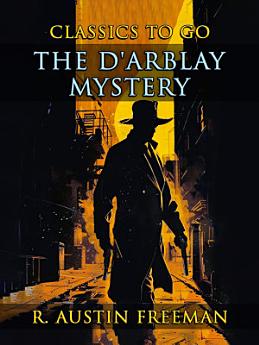The D'Arblay Mystery
Mar 2024 · Otbebookpublishing
Ebook
215
Pages
family_home
Eligible
info
reportRatings and reviews aren’t verified Learn More
About this ebook
Austin Freeman. When a man is found floating beneath the skin of a green-skimmed pond one morning, Dr Thorndyke becomes embroiled in an astonishing case. This wickedly entertaining detective fiction reveals that the victim was murdered through a lethal injection and someone out there is trying to cover it up.
About the author
R. Austin Freeman, born Richard Austin Freeman on April 11, 1862, in London, was a pioneering British author and physician best known for his creation of the forensic detective Dr. John Thorndyke. Freeman's unique blend of medical knowledge and literary prowess revolutionized the detective fiction genre, earning him a place among the greats of early 20th-century literature.Freeman's career began in the medical field, where he worked as a physician and surgeon, experiences that deeply informed his writing. His meticulous attention to detail and scientific accuracy set his work apart, making him a forerunner in the genre of forensic science fiction. His stories often featured innovative investigative techniques and a logical approach to solving crimes, which influenced contemporary writers and laid the groundwork for modern forensic thrillers.One of the most intriguing aspects of Freeman's life was his method of writing "inverted" detective stories, where the crime and perpetrator are revealed at the beginning, and the narrative focuses on the detective's process of solving the case. This unconventional approach captivated readers and showcased Freeman's ingenuity.Despite his success, Freeman was not without controversy. His staunch conservative views and occasional forays into contentious social commentary sparked debate among his contemporaries. Nonetheless, his contributions to literature were undeniable, and his influence can be seen in the works of later authors like Agatha Christie and Dorothy L. Sayers.Freeman's legacy endures through his innovative storytelling and the indelible mark he left on the detective fiction genre. His life and work continue to intrigue and inspire modern readers and writers alike.
Rate this ebook
Tell us what you think.
Reading information
Smartphones and tablets
Install the Google Play Books app for Android and iPad/iPhone. It syncs automatically with your account and allows you to read online or offline wherever you are.
Laptops and computers
You can listen to audiobooks purchased on Google Play using your computer's web browser.
eReaders and other devices
To read on e-ink devices like Kobo eReaders, you'll need to download a file and transfer it to your device. Follow the detailed Help Center instructions to transfer the files to supported eReaders.







